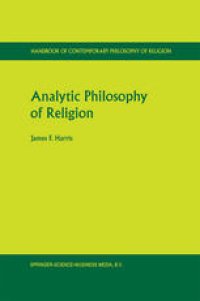
Ebook: Analytic Philosophy of Religion
Author: James F. Harris (auth.)
- Tags: Philosophy of Religion, Religious Studies, Modern Philosophy, Ontology, History of Philosophy
- Series: Handbook of Contemporary Philosophy of Religion 3
- Year: 2002
- Publisher: Springer Netherlands
- Edition: 1
- Language: English
- pdf
When Gene Long, editor of Kluwer's Handbook of Contemporary Philosophy of Religion Series, first invited me to write the volume on Analytic Philosophy of Religion, I accepted with great enthusiasm. My only explanation for that enthusiasm now is that I was younger and more naive at the time. Soon after starting work on the volume, my enthusiasm was dampened by the daunting magnitude of the task. I began as a sprinter and quickly settled into the pace of a long-distance runner. Although I considered myself well read in the subject, I soon discovered that I had a great deal of research to do to be confident that I had considered all of the major contributions to the various discussions, issues, and of religion. As I read more and more problems found within analytic philosophy books and articles, I realized that I had rushed into a territory already well trodden by the angels. I am greatly impressed by the sophistication and subtlety of philosophical argument that characterize the different debates in contemporary analytic philosophy of religion. This volume covers a vast amount of material. I have endeavored to provide the fairest possible reading of different authors, and, in cases where I include my own critical evaluations and develop my own positions, I have endeavored to provide the strongest possible interpretations of the positions I criticize.
This book should prove to be an invaluable resource and reference for both scholars and students interested in any problem in the area of analytic philosophy of religion.
Analytic Philosophy of Religion is a thorough examination of the major issues that have occupied twentieth-century Anglo-American, analytic philosophy of religion and the positions that have been developed by the major figures in the field. The author also develops his own critical reactions to these positions and, in many cases, his own positions as well. Attention is focused on what have proven to be the enduring, major problems of analytic philosophy of religion: the development and nature of analytic philosophy, the problem of religious language, the nature of God, arguments for the existence of God, religious experience, religious epistemology, religion and science, the problem of evil, naturalism and humanism, religion and ethics, and religious pluralism.
For contents and a free preview for all three volumes: www.new-in-philosophy.com